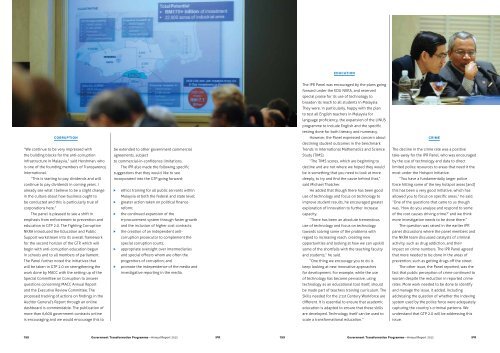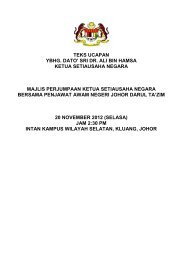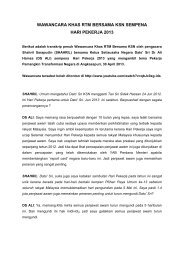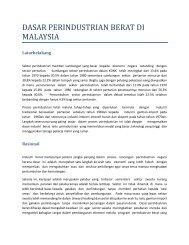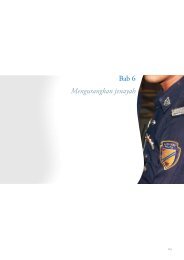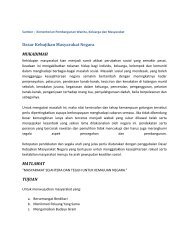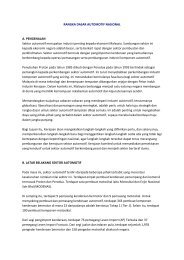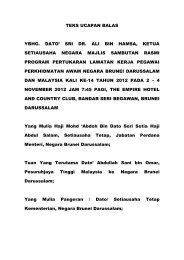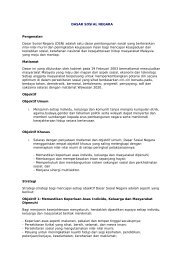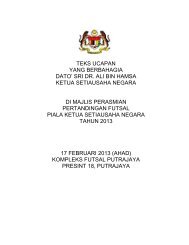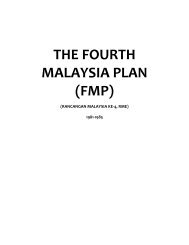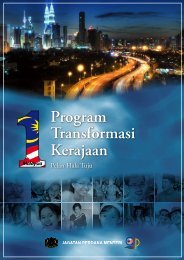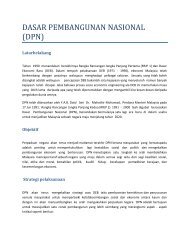GTP 2.0 - Prime Minister's Office of Malaysia
GTP 2.0 - Prime Minister's Office of Malaysia
GTP 2.0 - Prime Minister's Office of Malaysia
Create successful ePaper yourself
Turn your PDF publications into a flip-book with our unique Google optimized e-Paper software.
CoRRuPtIoN<br />
“We continue to be very impressed with<br />
the building blocks for the anti-corruption<br />
infrastructure in <strong>Malaysia</strong>,” said Hershman, who<br />
is one <strong>of</strong> the founding members <strong>of</strong> Transparency<br />
International.<br />
“This is starting to pay dividends and will<br />
continue to pay dividends in coming years. I<br />
already see what I believe to be a slight change<br />
in the culture about how business ought to<br />
be conducted and this is particularly true <strong>of</strong><br />
corporations here.”<br />
The panel is pleased to see a shift in<br />
emphasis from enforcement to prevention and<br />
education in <strong>GTP</strong> <strong>2.0</strong>. The Fighting Corruption<br />
NKRA introduced the Education and Public<br />
Support workstream into its overall framework<br />
for the second horizon <strong>of</strong> the <strong>GTP</strong>, which will<br />
begin with anti-corruption education begun<br />
in schools and to all members <strong>of</strong> parliament.<br />
The Panel further noted the initiatives that<br />
will be taken in <strong>GTP</strong> <strong>2.0</strong> on strengthening the<br />
work done by MACC with the setting up <strong>of</strong> the<br />
Special Committee on Corruption to answer<br />
questions concerning MACC Annual Report<br />
and the Executive Review Committee. The<br />
proposed tracking <strong>of</strong> actions on findings in the<br />
Auditor General’s Report through an online<br />
dashboard is commendable. The publication <strong>of</strong><br />
more than 6,600 government contracts online<br />
is encouraging and we would encourage this to<br />
be extended to other government commercial<br />
agreements, subject<br />
to commercial-in-confidence limitations.<br />
The IPR also made the following specific<br />
suggestions that they would like to see<br />
incorporated into the <strong>GTP</strong> going forward:<br />
ethics training for all public servants within<br />
<strong>Malaysia</strong> at both the federal and state level;<br />
greater action taken on political finance<br />
reform;<br />
the continued expansion <strong>of</strong> the<br />
e-procurement system through faster growth<br />
and the inclusion <strong>of</strong> higher cost contracts;<br />
the creation <strong>of</strong> an independent anticorruption<br />
prosecutor to complement the<br />
special corruption courts;<br />
appropriate oversight over intermediaries<br />
and special <strong>of</strong>ficers whom are <strong>of</strong>ten the<br />
progenitors <strong>of</strong> corruption; and<br />
promote the independence <strong>of</strong> the media and<br />
investigative reporting in the media.<br />
198 Government transformation Programme—Annual Report 2012 IPR 199<br />
Government transformation Programme—Annual Report 2012 IPR<br />
EDuCatIoN<br />
The IPR Panel was encouraged by the plans going<br />
forward under the EDU NKRA, and reserved<br />
special praise for its use <strong>of</strong> technology to<br />
broaden its reach to all students in <strong>Malaysia</strong>.<br />
They were, in particularly, happy with the plan<br />
to test all English teachers in <strong>Malaysia</strong> for<br />
language pr<strong>of</strong>iciency, the expansion <strong>of</strong> the LINUS<br />
programme to include English and the specific<br />
testing done for both literacy and numeracy.<br />
However, the Panel expressed concern about<br />
declining student outcomes in the benchmark<br />
Trends in International Mathematics and Science<br />
Study (TIMS).<br />
“The TIMS scores, which are beginning to<br />
decline and are not where we hoped they would<br />
be is something that you need to look at more<br />
deeply, to try and find the cause behind that,”<br />
said Michael Thatcher.<br />
He added that though there has been good<br />
use <strong>of</strong> technology and focus on technology to<br />
improve student results, he encouraged greater<br />
exploration <strong>of</strong> innovation to further increase<br />
capacity.<br />
“There has been an absolute tremendous<br />
use <strong>of</strong> technology and focus on technology<br />
towards solving some <strong>of</strong> the problems with<br />
regard to increasing reach, creating new<br />
opportunities and looking at how we can upskill<br />
some <strong>of</strong> the shortfalls with the teaching faculty<br />
and students,” he said.<br />
“One thing we encourage you to do is<br />
keep looking at new innovative approaches<br />
for development. For example, while the use<br />
<strong>of</strong> technology has become pervasive, using<br />
technology as an educational tool itself, should<br />
be made part <strong>of</strong> teachers training curriculum. The<br />
Skills needed for the 21st Century Workforce are<br />
different. It is essential to ensure that academic<br />
education is adapted to ensure that these skills<br />
are developed. Technology itself can be used to<br />
scale a transformational education.”<br />
CRImE<br />
The decline in the crime rate was a positive<br />
take-away for the IPR Panel, who was encouraged<br />
by the use <strong>of</strong> technology and data to direct<br />
limited police resources to areas that need it the<br />
most under the Hotspot Initiative.<br />
“You have a fundamentally larger police<br />
force hitting some <strong>of</strong> the key hotspot areas [and]<br />
this has been a very good initiative, which has<br />
allowed you to focus on specific areas,” he said.<br />
“One <strong>of</strong> the questions that came to us though<br />
was, ‘How do you analyse and respond to some<br />
<strong>of</strong> the root causes driving crime?’ and we think<br />
more investigation needs to be done there.”<br />
The question was raised in the earlier IPR<br />
panel discussions where the panel members and<br />
the NKRA team discussed catalysts <strong>of</strong> criminal<br />
activity, such as drug addiction, and their<br />
impact on crime numbers. The IPR Panel agreed<br />
that more needed to be done in the areas <strong>of</strong><br />
prevention, such as getting drugs <strong>of</strong>f the street.<br />
The other issue, the Panel reported, was the<br />
fact that public perception <strong>of</strong> crime continued to<br />
worsen despite the reduction in reported crime<br />
rates. More work needed to be done to identify<br />
and manage the issue, it added, including<br />
addressing the question <strong>of</strong> whether the indexing<br />
system used by the police force were adequately<br />
capturing the country’s criminal patterns. We<br />
understand that <strong>GTP</strong> <strong>2.0</strong> will be addressing this<br />
issue.


